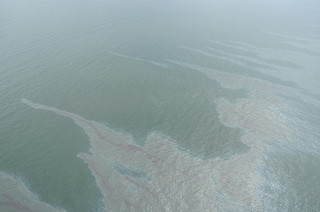Last week was the second-year anniversary of the devastating BP spill in the Gulf of Mexico. The release of at least 4.9 million barrels of oil, which BP then used at least 1.9 million gallons of toxic Corexit dispersants to sink, has been described as the largest human-caused environmental disaster in the U.S.
BP disaster still being felt
While the legal battle over responsibility and compensation for the BP spill still unfolds (BP has agreed to pay 7.8 billion in settlement, but further court challenges loom), new evidence is coming to the surface about the spill’s ongoing impacts.
As reported by Al Jazeera, “Gulf oil drillers are having their busiest year since 2010, but fishermen say their businesses are still suffering and scientists report seeing a disturbing amount of mutated sea life…Half of all the oysters sold in the U.S. used to come from Louisiana’s waters but the region’s fishermen now supply just one fifth. Brad Robin, an oyster fisherman who has been facing economic ruin since the spill, says: ‘The truth of the matter is it’s not there to catch, we can’t catch it. It’s terrible. “You know disaster is an understatement for what they have done. They destroyed my industry, they destroyed my livelihood, they destroyed my business …'”
While BP assures that Gulf of Mexico seafood is highly regulated and frequently tested and safe, mutated sealife found has included eyeless shrimp, crabs with no claws and fish with tumours and boils. Also reported by Al Jazeera, ” Darla Rooks, a lifelong fisherperson from Port Sulfur, Louisiana, [said] she is finding crabs “with holes in their shells, shells with all the points burned off so all the spikes on their shells and claws are gone, misshapen shells, and crabs that are dying from within … they are still alive, but you open them up and they smell like they’ve been dead for a week.”
Lessons (not) learned… yet
Last year I wrote an op-ed for the Georgia Straight, arguing the release of The Rights of Nature: The Case for a Universal Declaration of the Rights of Mother Earth, was an ideal way to celebrate the one-year anniversary of the BP disaster:
“I can think of no better way to mark the anniversary of the spill because this book outlines the type of thinking and actions we need to prevent similar future catastrophes. True prevention of another disaster does not lie in temporary moratoriums and debates over the acceptability of one safety measure versus another — albeit these can have a legitimate role in stopping immediate threats — but rather in humanity taking a collective step forward, beyond seeing nature as property something to be used, abused, and sold, to a more holistic understanding of the human-ecosystem relationship.”
While this remains true, and our movement discussions over how to recognize the rights of nature and community rights and achieve system change must continue, our political reality has us staunchly on the defensive.
The threat of tanker spills off the B.C. Coast from the proposed Enbridge Northern Gateway Project and the Kinder Morgan Trans Mountain pipeline expansion and offshore drilling in the Gulf of St. Lawrence, future drilling in the Canadian Arctic, alongside draconian rollbacks to federal environmental assessments and funding for environment protection require immediate attention. We must bear in mind the legacy of the BP spill and the collective vision of what we want moving forward, in pushing back these threats in the coming months.
No Pipelines! No Tankers!
The Council of Canadians’ new No Pipelines! No Tankers! campaign will be a major focus for the Energy and Climate Justice 2012-2013 campaign. We will work with our chapters, members and allies to oppose the Enbridge and Kinder Morgan pipelines as well as the Pacific Trails pipeline. This past Sunday, people hit the streets in over 10 communities to mark Earth Day by sending a strong No Pipelines! No Tankers! message. The Council of Canadians is prioritizing solidarity with Indigenous and First Nations opposition to the projects, recognizing communities’ right to say no, and that impeding legal challenges in the case of the Enbridge pipeline stand to significantly delay and stop the pipeline. The Council of Canadians has worked in B.C. in solidarity with communities such as the Unistoten Clan of the Wet’suwet’en in defending their right to say “no” to pipelines. In October 2012, the Council is organizing a mobilizing tour in communities along proposed pipeline routes, providing the opportunity for further consultation and solidarity. Faced with a federal government committed to the approval of this project, the growing opposition movement in B.C. is preparing to engage in non-violent civil disobedience. The Council of Canadians will continue to participate in these conversations, and movements. We are also reviewing a number of other campaign strategies to stop these pipelines.
No offshore drilling in the Gulf of St. Lawrence
The Council of Canadians is part of the St. Lawrence Coalition which is calling for a moratorium on drilling in the Gulf to allow the time to assess the impacts that drilling would have, ensure the strictest rules are applied and allow people in the region the ability to choose in an informed and collective manner, whether or not oil and gas drilling should take place. There is currently a prospect site for drilling owned by Corridor Resources in an ecologically sensitive area called “Old Harry,” which we are tracking and preparing to respond to, including in forthcoming public consultations. Among other actions, the Council of Canadians submitted a letter to the Canada-Newfoundland and Labrador Offshore Petroleum Board expressing our concern over offshore drilling in the St. Lawrence and Atlantic chapters issued a media release stating their serious concerns about the prospect of drilling. We are continuing to monitor the situation and will respond with a strategic, regional campaign.



